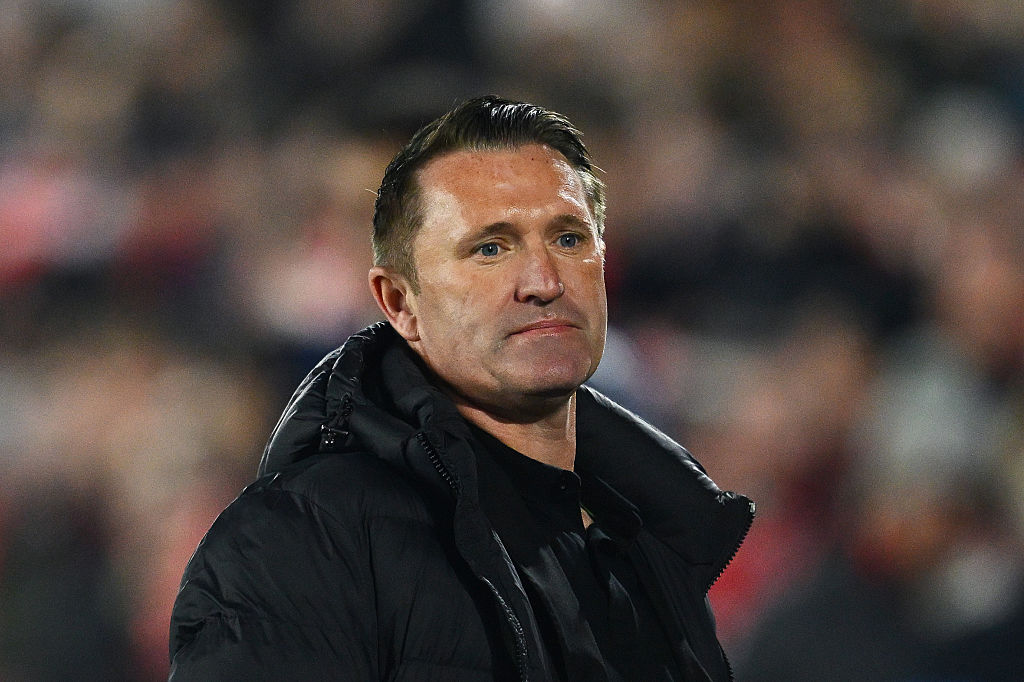Virgil van Dijk exclusive: “I’m not going to lie, I was pretty scared – I could have died”
The Dutch defender has transformed the Reds into Premier and Champions League contenders – and even he thinks he’s been worth every penny...
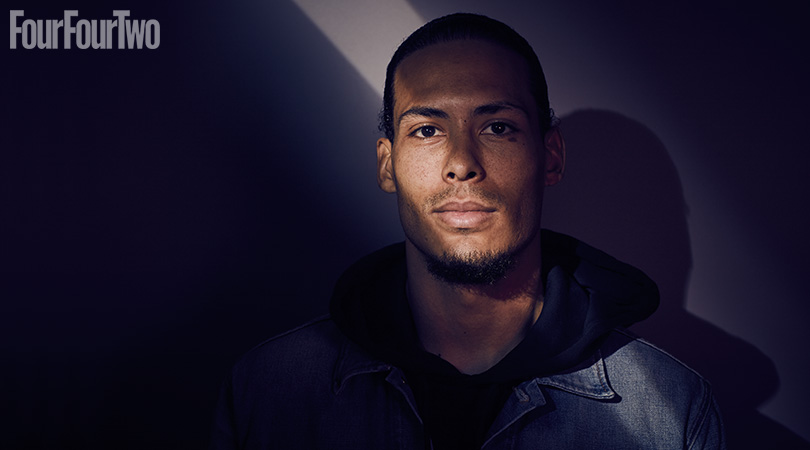
The best features, fun and footballing quizzes, straight to your inbox every week.
You are now subscribed
Your newsletter sign-up was successful
Want to add more newsletters?

Five times a week
FourFourTwo Daily
Fantastic football content straight to your inbox! From the latest transfer news, quizzes, videos, features and interviews with the biggest names in the game, plus lots more.

Once a week
...And it’s LIVE!
Sign up to our FREE live football newsletter, tracking all of the biggest games available to watch on the device of your choice. Never miss a kick-off!
Join the club
Get full access to premium articles, exclusive features and a growing list of member rewards.
An edited version of this feature originally appeared in the April 2019 issue of FourFourTwo. Subscribe!
For the first time in his life, Virgil van Dijk was scared. Really scared. The 6ft 4in tower of pure muscle lay in a hospital bed, in extreme, near-constant pain, with tubes dangling out of his body.
Van Dijk, Groningen’s promising 20-year-old centre-back, had felt unwell for a week, but had brushed off his illness as simply a bad fever. So had another hospital. In actual fact, on April Fool’s Day 2012, his appendix had ruptured and he was suffering from both peritonitis and a kidney infection. He needed immediate, life-saving surgery.
“I remember everything about it,” he says, nearly seven years later, from the plush confines of Liverpool’s training ground. Van Dijk pauses and looks FourFourTwo straight in the eye to make sure we’re listening. “I’m not going to lie, I was pretty scared. I could have died.”
People talk about the pressure of the Premier League title race, about whether Liverpool have the bottle to take on champions Manchester City in the most exciting season denouement for years.
But they’re missing the point. Real pressure is lying in hospital, worrying about your future. Pressure is not knowing if you’ll ever kick a ball again. Perhaps even draw breath.
Compare that with winning the PFA Players’ Player of the Year award, trying to lead the Merseysiders to a first league title for 29 years and becoming arguably the world’s best central defender, and it’s easy to see why Virgil van Dijk’s occasional bouts with footballing pressure just drift away.
The best features, fun and footballing quizzes, straight to your inbox every week.
Liverpool’s missing link
All is quiet on a nondescript February Thursday in West Derby, a couple of miles east of Liverpool city centre. All, that is, bar one self-contained ecosystem nestled between two roads at the suburb’s heart; somewhere abuzz with constant midweek activity.
Melwood, Liverpool’s training ground and home to most of the club’s administrative staff, is that sort of place – a happy family environment where everyone always says hello.
Manager Jurgen Klopp walks breezily into the complex, straight past hollowed-out footballs that house several office plants. Captain Jordan Henderson stops next to the spacious press room to say hi. Goalkeeper Alisson slips through to an adjacent room for an interview with Football Focus. Outside in the car park, midfielder Alex Oxlade-Chamberlain has commandeered a club official, holding two bottles of mineral water, to help him put some drinks in his car.
Virgil van Dijk then marches in, cheerily introducing himself to the FFT crew with a handshake strong enough to crack a Brazil nut. Dressed in a black hoodie and jeans with a denim jack, he’s so tall, he has to crouch to get through the door.
“How is everyone?” says the relaxed 27-year-old, surveying the most recent FFT covers and a couple of picture ideas for his impending photo shoot. “I’ve been looking forward to this. Let’s get going.”
You’d never think this is a club in crisis. Three nights ago, Liverpool had drawn 1-1 at West Ham – their second successive stalemate after being held by Leicester at Anfield – to allow Manchester City to return to the Premier League summit with a 2-0 victory at Everton. Ten days earlier, the Reds could have gone seven points clear of the champions, but at the time of interview trailed Pep Guardiola’s men on goal difference. Van Dijk stifles a laugh – this is someone who actively revels in the situation.
“Honestly, I like being a part of it,” insists the defender. “I understand our supporters would rather be seven points clear at the top of the table, but this is the situation we’re in, you know? We need everyone together, and we’re going to give everything.”
Photo: Jon Enoch
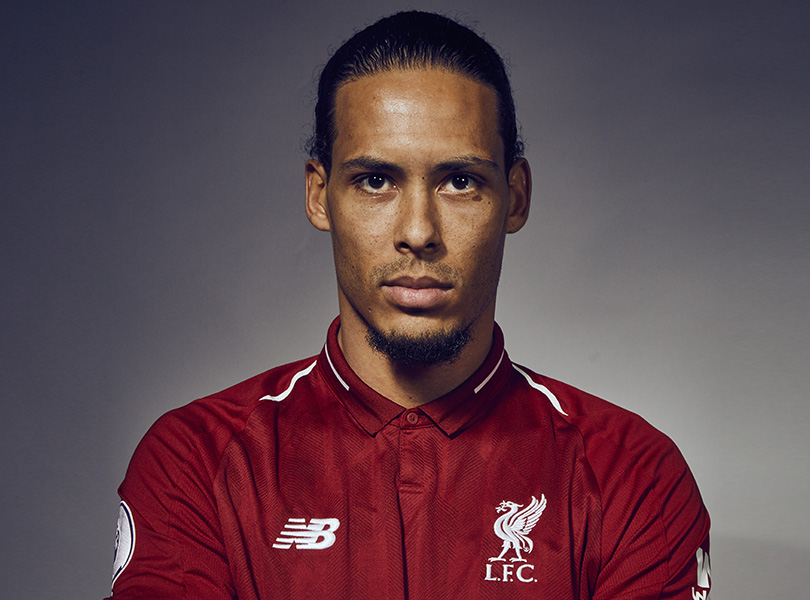
Only James Milner (Manchester City), Fabinho (Monaco) and Xherdan Shaqiri (Bayern Munich) have winner’s medals from one of Europe’s top five leagues. So as a two-time Scottish Premiership champion with Celtic, how much does experience help?
“With Celtic it’s a bit different, but winning the league makes you feel even more proud of yourself and the team,” explains Van Dijk. “It’s a sign of the hard work you’ve put in over the course of a whole season. That motivates you. Winning the Premier League title puts you in the history books forever and makes you a legend. That’s why you play football. You want to become a legend.”
Some would say Van Dijk’s already there, the brick wall around which Klopp’s organised chaos is built. The defender has added steel to the red half of Merseyside. Liverpool conceded 1.2 goals a game before Van Dijk’s arrival for a world-record £75 million in January 2018. With him in the team for the remainder of 2017/18, that figure shrank to 0.8.
This term, they shipped just seven in their first 19 league games, a staggering spell of parsimony which only began to falter as injuries bit at the turn of the year.
“The whole team is defending differently,” says Van Dijk, his booming baritone echoing around the room. “It all starts from the front: the work our attackers put in is incredible, and so often overlooked. Of course, if the ball comes to us, we still need to do our bit.
“Our start to the year wasn’t as good as we’d have wanted, but you’ll always have difficult moments because you can’t be at your best all the time. The improvements we’ve made since last season are obvious.
“We can see games out now, controlling them better than we used to. We’re always going to create chances with the attacking talent we have, so if you can keep the opposition out, you’re going to win. Give me the clean sheet, any day...”
Yet the quiet efficacy he has brought to Anfield is about more than just defending’s nuts and bolts.
“It’s leadership,” he interjects before we can even finish asking the question. “That’s who I am. In my position, you have to lead, organise players and be an example. I know what I want. I’ve never been quiet. If I think about something, I’ll always open my mouth and tell you.
“Look at LeBron James in basketball or Tom Brady in the NFL. They are proper leaders, who are among the best in their sports of all time. They are under immense pressure every day, but they still show their team-mates what can be achieved and inspire them to bigger heights. I want to get the best out of myself, but I also like helping the players around me to make the most of themselves, too.”
No surprise, then, that the Dutchman topped a team vote to become Liverpool’s third captain earlier this season, with both Henderson and Milner injured for the Champions League group game at home to Red Star Belgrade. The Reds won 4-0.
“I like to be involved,” says Van Dijk, pressing back his shoulders into his seat. “I captained under-18s teams in the Netherlands and I love that responsibility. You talk to guys, you find out what’s going on with them. To have been here, a club with such huge history, for only a year, that was a very proud moment.”
In truth, Klopp would probably still have plumped for Van Dijk had he not opted for democracy over gut instinct.
“From the first second, he was brilliant,” beamed Klopp. “I knew long before he signed that he would be outstanding. His mix of both playing ability and leadership quality makes him outstanding.”
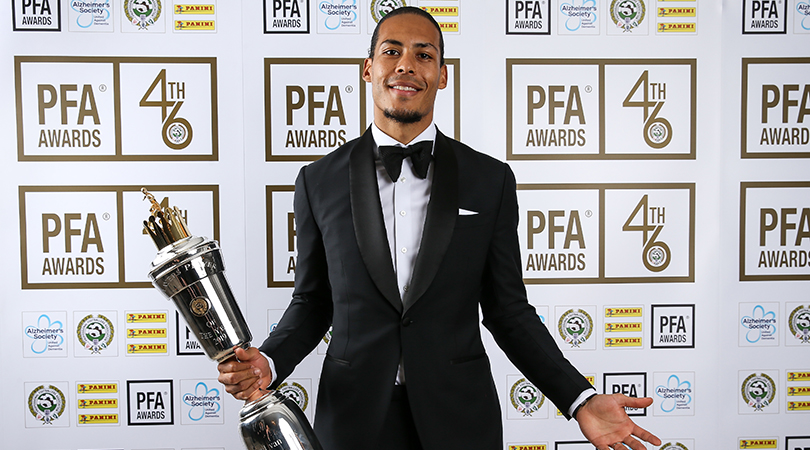
The feeling between coach and commanding centre-half is mutual.
“He’s a great man-manager, he really knows how to ‘get’ to players, do you know what I mean?” explains Van Dijk. He thinks for a second, determined to articulate the Klopp methodology. “It’s hard to find the right words for him – he instinctively knows when to work individually with someone and when to tell them the right things at the right time. His whole backroom staff complement him very well.
“You can see it when we scored in the last seconds against Everton earlier this season and he ran onto the pitch. That’s just pure joy, pure happiness, and he’s expressing what everyone watching is feeling. Any fan would run onto the pitch to celebrate like that, but that sums him up. He’s not trying to be anything he’s not – he’s being himself.”
Van Dijk, of course, claimed the assist of the season that day – his attempted volley from the edge of the penalty area looped skywards and bounced twice on Jordan Pickford’s crossbar, before Divock Origi bundled home the 96th-minute winner.
“I won’t be claiming that one, it was a terrible mishit,” he chuckles, rolling his eyes in embarrassment. “A crazy end to a great game. They did well, but we were better.”
Legendary advice
Van Dijk and Everton have history. It was against the Toffees that the Reds’ No.4 made his debut in the FA Cup Third Round in January 2018. Not that he was supposed to.
“The boss was worried it would be a bit too early and said I’d be on the bench, but a few of the guys were complaining of tight hamstrings and he didn’t want to risk them,” he laughs.
Van Dijk hadn’t had a proper session with his new team-mates, who were still recovering from a win at Burnley. “So, instead, he took a risk with me,” he continues. “Klopp only told me I’d be starting during the warm-up. ‘Are you ready?’ he asked me. I replied, ‘Of course.’ I wasn’t nervous, just excited to get out there and play.”
Not only did he play on a snowy Friday evening at Anfield, Van Dijk headed home an 84th-minute winner.
“That was really special, of course,” he says. “The first thing you do when you join a new club is look at who your debut might be against. So many things went through my head at that moment.
“Looking back, things couldn’t have gone much better. You dream about what could happen, and it’s been going pretty well.”
Van Dijk snorts at the obvious understatement in his statement. In little more than a year, the Dutchman has evolved from a highly-rated Premier League centre-back with Southampton into one of the world’s best defenders, someone who has led Liverpool to the top of the table and a Champions League final.
“I actually went to the 2017 final in Cardiff between Real Madrid and Juventus with a friend, to take in the occasion,” he says. “It’s a proper show, like the Super Bowl. There are so many people watching it and I knew I wanted to be at that level. To experience everything the year after in Kiev just confirmed that, and I want it even more now. OK, we lost the game, but that’s something I’ve wanted to build on in my first full season with the club.”
Kiev – the one word which sends shudders down Red spines. Watch Klopp’s post-match press conference and you’ll witness the sense of despair which followed the 3-1 defeat to Real Madrid.
“That was so tough,” concedes the 27-year-old. For the only time in more than an hour with the stopper, his laidback demeanour stiffens. To begin with, he chooses his words carefully. Then a torrent follows. “You have so many emotions going through your body. We had a long time to ourselves because the flight back from Kiev landed a couple of hours before our friends and family.
“We arrived devastated, early in the morning, but you can’t sleep as you’re still wired with adrenaline. Two days later, I was away with the national team. Personally, that was a good thing because I had some other football to focus on.
“After that, I went on holiday, but even there you can’t really escape it. You think you’re over it, then someone will come up to you and say, ‘Unlucky in the final.’ People mean well, but you’re reminded of it a lot. Take it, learn from it and try to not let it happen again.”
Photo: Jon Enoch
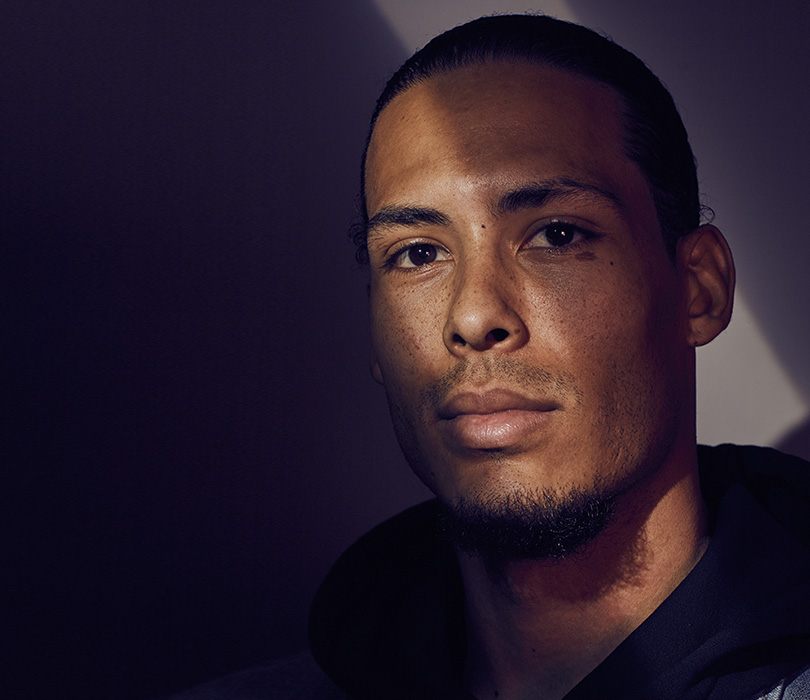
It’s inconceivable that Liverpool would have got that far without the imposing centre-back sat opposite FFT. So stellar has been Van Dijk’s form, initial reservations about the £75m fee spent on a defender have been replaced with praise for a particularly prescient investment.
Premier League frontmen are queueing up to proclaim Van Dijk the best player, not just defender, they’ve ever come up against. There is more to the Dutchman than aerial dominance, superb reading of the game and expert tackling.
Just ask Wolves wideman Adama Traore, who was given a five-yard headstart by Van Dijk in December’s league match at Molineux, but still lost a foot race with the defender.
“He is an exceptional player,” City supremo Guardiola has admitted of Liverpool’s defensive totem. “When a player costs whatever it costs and it works, it is well worth it. If he can play every three days with no injuries and play consistently, it is well worth it.”
Van Dijk himself agrees.
“That’s the market now,” he says. No platitudes about ‘focusing on football’ and ‘not letting the fee affect me’. Just the self-assurance of someone who knows their own worth. “If clubs want a player, you’ve got to pay up. I was just proud that Liverpool were willing to pay that kind of money for me.
“When the transfer didn’t happen in the summer of 2017, I got my head down and carried on playing. I came back from an eight-month ankle injury and there was a fair bit of pressure because Southampton were struggling. People were saying I wasn’t at my previous level, but that was the situation. Everything happens for a reason, so I wanted to show what I could do.”
What he’s done is make himself such an Anfield favourite that he’s already got his own chant. Bellowed to the tune of The Dubliners’ folk classic Dirty Old Town, it builds to the stirring crescendo: ‘He can pass the ball, calm as you like, he’s Virgil van Dijk, he’s Virgil van Dijk!’
“To have my own song within a year of signing for the club is pretty special,” he smiles. “I didn’t know the song before, but I really like it.”
Did he know about the providence of the original ditty, written about Salford? “I’d heard they’re from Manchester, actually, which is funny,” he says. “I’ve seen videos of fans singing it in pubs – it’s great.
“Sometimes people underestimate the power the fans have on us. On Champions League nights especially, the atmosphere is incredible at Anfield. It inspires you throughout the game, giving you that extra push in the tough moments. ”
Such a sense of community binds Liverpool’s star centre-back to the club. On his first day as a Red, Anfield legend Kenny Dalglish gave the newbie his phone number and implored him to call any time.
“It’s like a museum here on matchdays,” smiles Van Dijk. “Anyone who’s ever played for Liverpool is always welcome back, and so many of the old players are still involved with different parts of the club. It’s amazing to see. The club’s history is unbelievable. You go through any door and it’s not just the pictures on the walls, but there are legends there to chat to about their experiences. There’s this warmth, among the people if not the weather! You feel part of the family.
“The people around the city are so friendly. It’s intense as everyone here lives and breathes football. I’m enjoying every bit of it. I’m even becoming more and more of a Beatles fan as time goes on.”
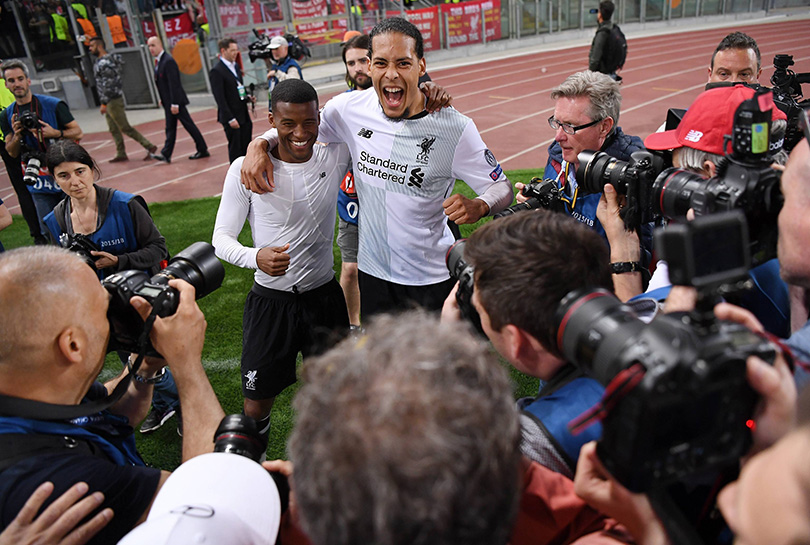
Another historic member of the Liverpool fabric was at the forefront of Van Dijk’s mind when choosing his squad number. A product of the Willem II academy, the Dutchman went straight after the No.4 shirt once sported by Sami Hyypia, the Finnish defender who arrived from the same club for £2.6m in 1999 and won every major prize with the Reds, bar the league title.
“There was a list of numbers available and No.4 was one of them – it’s a shirt centre-backs often wear in the Netherlands,” says Van Dijk. “To get it here was special, though, because of the Willem II link with Sami. His career here was incredible.”
“That was some April Fool’s joke. The pain was terrible”
Born in Breda – a quiet city famous as the home of Oranjeboom and the future Charles II before the restoration of the English monarchy in 1658 – to a Dutch father and Surinamese mother, all Virgil van Dijk ever wanted to be was a footballer. He would go and play wherever he could – on the streets, in concrete cages, and eventually more organised Saturday morning matches.
“I was talking about those days playing on the streets with a pal recently, they were fantastic times,” he recalls wistfully. Better than even that, though, were the local tournaments for local amateurs WDS’19 in the Breda area.
“You’d watch any game that was going on, then your team’s name would be called. ‘Ten minutes, get ready…’ and you’d be off. Good times, fun times, when nothing really mattered, just football.
“I still try to remember those tournaments, because football now brings its own pressures. I like to remind myself to enjoy the game, like I did back then, as your career is very short.”
Van Dijk soon honed a keen winning mentality, based on his hero, Ronaldinho.
“It’s something I’ve tried to recreate, playing mini five-a-side events on Cruyff Courts on Sundays and occasionally midweek,” explains the Dutchman. “There were so many good players around that you’d play winner stays on. If you lost, you knew there were half a dozen teams waiting to come on and you’d then go to the back of the queue again, waiting for your turn. You did everything possible to stay on the court.”
Tongues wagged about the robust eight-year-old dominating cage football and tournaments around Breda.
“The natural thing would be to play for the local team, NAC Breda,” says Van Dijk of his first trial. “I remember walking in and a coach was shouting like crazy at these young players. It put me off straight away – I couldn’t believe it.
“A week or so later, I had a trial at Willem II and I loved it there. My dad took me, as Tilburg is about half an hour from Breda, and told me on the way that they were in the Champions League because they’d just finished 2nd in the Eredivisie [in 1998/99]. The atmosphere was so much nicer there. I ended up staying with them for about 10 years and I enjoyed every minute of it.”
He impressed straight away, not by gradually sliding further back as a failed striker like many stoppers, but because of his defensive nous.
“There was no striker who could touch him,” youth team coach Jan van Loon told FFT last year. “He was strong and had a natural talent to take balls off opponents at just the right moment. He intuitively knew how to defend, even though now and then he could come across as a bit too easy-going.”
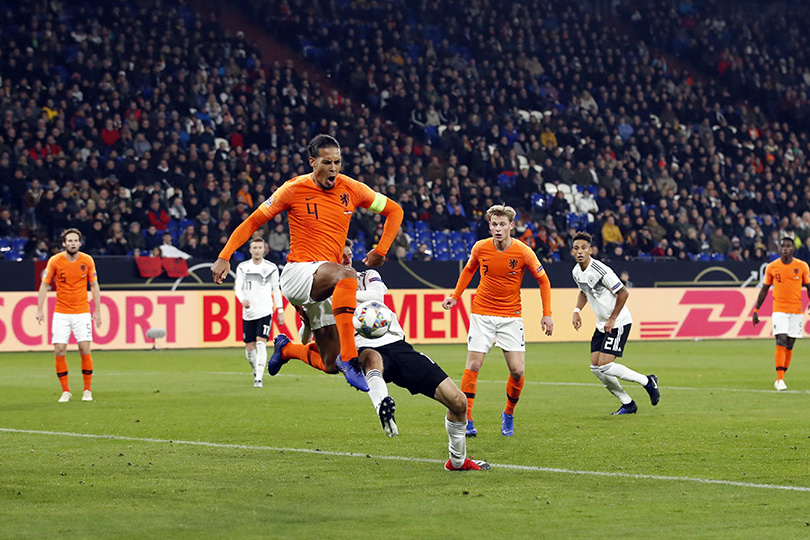
It’s a weakness – if you can call it that – which has followed Van Dijk. The Rolls-Royce defender, in general, remains unfathomably mistrusted. So much so that at 18, with coaches divided, Willem II stalled on offering the youngster professional terms.
“I didn’t feel appreciated because they hadn’t made me an offer at a time where I’d be in the reserves or under-23s,” he says. “They didn’t want to take the gamble, but Groningen did.”
So, Virgil relocated 160 miles north east – almost the full diameter of the Netherlands – in 2010 and settled into the club’s under-23s. Yet the occasional doubt behind the scenes remained.
“Even when I made my professional debut for Groningen in May 2011, people said I looked nonchalant, but it’s just the presence I have,” he shrugs. “It’s the way I am – I’m tall, quick and like to have the ball to oversee everything in front of me. It might look like that, but I’m actually looking at what’s next. I’m always busy.”
That sounds a bit like his Thunderbirds namesake, who’s constantly mopping up other people’s mess.
“I can’t say I watched it as a kid,” he laughs, FFT feeling our age at explaining a 50-year-old television show starring marionette puppetry to this supremely strong 21st century athlete. “If you say that’s Virgil’s character, then I’m pretty happy with that. We can share those things. I’m living up to it.”
His maiden month as a first-team regular certainly went FAB (sorry, we’ll stop now). A few weeks after that debut in a 4-2 win against ADO Den Haag, Van Dijk announced himself to the Dutch footballing public.
Groningen trailed 5-1 to the same opponents in a play-off to decide who would reach the following season’s Europa League. Deployed as an auxiliary centre-forward, Van Dijk bagged a brace – including a direct free-kick – in Groningen’s own 5-1 win, only to lose on penalties.
In his first full campaign, by now returned to his natural habitat in defence, Van Dijk shone. By the end of 2011/12, however, there would be a sting in the tail. It was April 1, 2012, Groningen were in relegation danger and had just lost 3-1 to local rivals Heerenveen.
“It was the first time I had lived away from home and I didn’t really know how to cook, so I ate a lot of rubbish,” says Van Dijk. He inhales, before letting out a reflective sigh.
“I’d been feeling pretty ill for most of the week, but then it hit me. All of a sudden, my appendix burst and it completely ruptured. It was very bad and the pain was terrible. I was rushed to hospital and had to have immediate surgery, because it was so serious I could have died.”
Another pause, this time to collect his thoughts, followed by a smile.
“That was some April Fool’s Day joke! Thankfully, I recovered. It was a huge blessing to come out the other side with my health. I’ve made sure my diet has been much better ever since.”
Helped by an unflinching work ethic, Van Dijk’s strength soon returned and so did his form, which piqued the interest of the Netherlands’ Big Three.
“I believe my agent at the time spoke to them,” he recalls of the summer of 2013. “PSV went for my friend Jeffrey Bruma. Ajax went for Mike van der Hoorn, who’s now at Swansea, and Feyenoord had Stefan de Vrij and Bruno Martins Indi, who was playing very well at the time.
“Ajax was the closest, but they wanted to wait and check a few things. At the same time, Celtic made it clear how much they wanted me before the season started and I didn’t want to wait for Ajax. It was a similar situation to how I joined Groningen from Willem II. Both were perfect moves for me.”
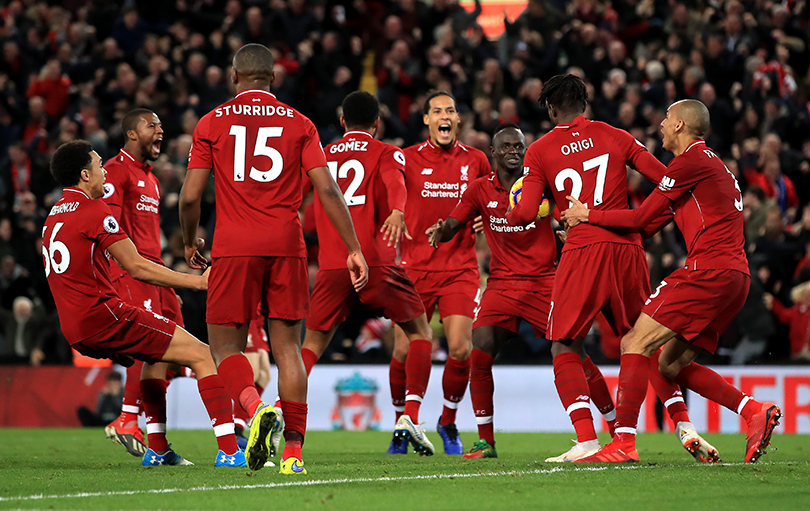
In two seasons at Parkhead following his £2.6m signing, Van Dijk impressed immensely. “How have we managed to get this guy?” one player exclaimed after the Dutchman’s opening training session. The same languid style, not fully trusted in his homeland, was anathema to Scottish football’s blood and thunder, while Van Dijk got his first taste of European football.
“It was an amazing step,” he says. “I learned so much, as a player and a human being. To lift three trophies in two years, play in the Champions League against Barça and Milan, and in the Europa League against Inter were great experiences for me and helped me to develop.”
Then comes the obvious question.
“Who sings You’ll Never Walk Alone better – Celtic or Liverpool? Both. I can’t pick one, because that’s like choosing between your children.”
A Premier League move was inevitable, the Dutch link with future national team boss Ronald Koeman at Southampton impossible to ignore in 2015.
“I loved my time there and appreciate what Southampton did for me,” says Van Dijk, despite the acrimony surrounding his departure north to Merseyside. “It’s the style they play. People talk about Liverpool signing their players – there’s no way they say, ‘We’ll take you, you and you.’ It’s just one of those things. I played with Sadio Mané; Clyney [Nathaniel Clyne] played with Adam Lallana and Mané.”
To immortality… and beyond
Van Dijk’s future is bright. In March, new Dutch boss Koeman – all too aware of his former Southampton charge’s qualities – made the 27-year-old captain, despite having won fewer than 20 caps.
“I couldn’t have been prouder when he told me,” says Van Dijk. “It was incredible wearing that captain’s armband for the first time against England. To lead out the team, the country almost, is something every youngster dreams of.”
It’s been a difficult few years for the Oranje, who have failed to qualify for the last two major tournaments. Like England, though, Holland can now call upon an exciting crop of youngsters and an experienced, world-class leader.
“We had an age gap between the generation of Wesley Sneijder, Robin van Persie and Rafael Van der Vaart and the next set of young players coming through,” says Van Dijk. “But with the quality we have, we should be going far at European Championships and World Cups. We know that and want to put it right.”
This summer, they have the chance to do just that and will take on England in the Nations League semi-finals.
“It’s still a bit too far away to have spoken to Liverpool’s England lads about it yet,” says Van Dijk. “Obviously that’ll begin to happen towards the end of the season. It will be a good game. Everyone in England is excited about the team and want to win the Nations League, but it’s exactly the same in the Netherlands.
“We’ve been doing pretty well for the last year. We topped a group with Germany and world champions France, which no one expected, and want to keep progressing with the youngsters coming through.”
Before all that, though, there’s a Premier League title for Van Dijk to fight for. How are the nerves?
“I like pressure,” comes his unequivocal response. “The good thing about our situation now is that we have to win every game. We know what we have to do. The problem is that we have another team in the league who are pretty good, so we have to keep pushing each other. That’s something I like.
“Obviously, you want to be in a situation where it’s a little bit easier, but it is what it is. We have to enjoy it, embrace it and go for it.”
And what if you end Liverpool’s 29-year wait?
“Oh, it would mean the world, of course it would,” he says, affording himself the briefest of daydreams. “It’s too early to think about it now, but it would be the stuff of dreams. You want to lift that trophy.”
Trinkets, awards and plaudits are all well and good, but he knows how finite his career is. Not least because of what happened on April Fool’s Day 2012.
“Being healthy is always the most important thing,” he concludes. “More than anything, me and my family’s personal happiness is what life’s all about. Health, happiness, family.
“I want to do what I’ve been doing my whole life. I know how short a career can be, so in five years I want to be in good shape, hopefully still here and winning titles.”
Liverpool fans would certainly hope so.
Moments later, Van Dijk stands imperiously in front of FFT’s cameras for the cover image. He folds his arms, biceps bulging, and looks mean and moody down the lens. This is almost a different person compared to the relaxed, friendly and thoughtful gentle giant we’ve sat opposite for more than an hour. No wonder strikers go nowhere near him.
“No one messes with me,” he glares. Suddenly, he struggles to keep a straight face. “Well, hopefully not.”
When you’ve been through what Virgil van Dijk’s been through, it’s easy not to take football too seriously. Pressure? What pressure?
This feature originally appeared in the April 2019 issue of FourFourTwo
While you're here, why not take advantage of our brilliant new subscribers' offer? Get 5 copies of the world's greatest football magazine for just £5 – the game's greatest stories and finest journalism direct to your door for less than the cost of a London pint. Cheers!
Then read…
FEATURE The making of Virgil van Dijk: how Liverpool's rock became the world's best defender
QUIZ! Can you name the PFA Premier League Teams of the Year from the last decade?
Andrew Murray is a freelance journalist, who regularly contributes to both the FourFourTwo magazine and website. Formerly a senior staff writer at FFT and a fluent Spanish speaker, he has interviewed major names such as Virgil van Dijk, Mohamed Salah, Sergio Aguero and Xavi. He was also named PPA New Consumer Journalist of the Year 2015.
 Join The Club
Join The Club










